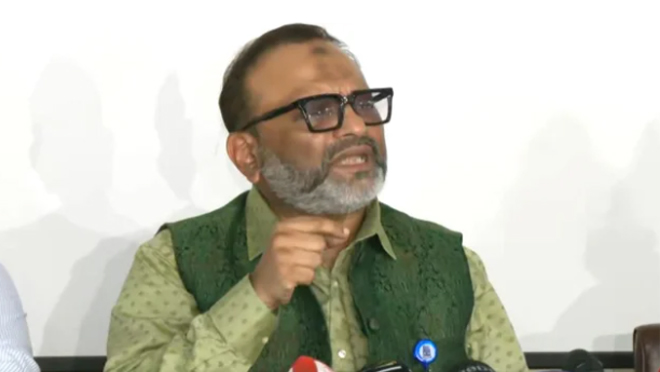DU VC says vendor 'forgot' to inform about Nilkhet ballot printing due to busy schedule
DU VC says vendor 'forgot' to inform about Nilkhet ballot printing due to busy schedule

Dhaka University Vice-Chancellor Professor Niaz Ahmed Khan has said the vendor “forgot” to inform them that 88,000 ballot papers for the Dhaka University Central Students’ Union (Ducsu) and hall union elections were printed at a Nilkhet market due to a busy schedule.
He made the remarks at an emergency press conference held at the Professor Abdul Matin Chowdhury Virtual Classroom in the university’s administrative building at 11am today (28 September).
The briefing was organised to address various issues arising after the Ducsu and hall union elections earlier this month.
In a written statement, Professor Niaz said that ballot printing was carried out by an experienced company selected through a competitive tender.
“Considering the record number of voters and candidates, our main vendor was given permission to involve an equally qualified associate company in the same tender to print the required number of ballots in the shortest possible time,” he said.
“The associate vendor did not inform the university authorities about the printing of the ballots in Nilkhet. They have provided an explanation for not informing the university authorities,” he added.
According to the vice-chancellor, the vendor later admitted that the associate company had printed 88,000 ballots at Nilkhet using 22 reams of paper.
After printing, cutting and pre-scanning, 86,243 ballots were supplied in sealed packets, while the surplus papers were destroyed.
“The primary vendor said that they brought the ballots to their main office [afterwards] for pre-scanning and subsequent activities, completed the pre-scan, sealed them in packets in a specified quantity, and supplied them to the university.
“They also stated that they ensured maximum security during the ballot preparation process and transportation as per the agreement. They admitted that they had forgotten to inform the authorities about the ballot printing and cutting in Nilkhet due to their busy schedule,” the VC said.
Professor Niaz stressed that the place of printing did not compromise the election’s fairness.
“Several steps are required to prepare a ballot for voting. Printing is only the first stage. After cutting to size, a security code is applied, followed by pre-scanning on an OMR machine. A ballot is valid only when it carries the seal and signature of the chief returning officer and the signature of the centre’s returning officer. The voting was conducted with due diligence after completing all these processes,” he said.
The vice-chancellor also provided figures on ballot usage. Out of 239,244 ballots prepared, 178,926 were used by 29,821 voters. With 39,874 registered voters receiving six ballots each, 60,318 ballots remained unused.
Responding to allegations regarding CCTV footage and signed voter lists, Professor Niaz said candidates could apply through the proper process to view specific footage or inspect particular signatures.
“If any candidate wishes to review CCTV of a specific incident, it can be arranged in the presence of designated experts. Similarly, signatures from the voter list may be shown if there is a valid reason, again under supervision,” he said.
After the polls, defeated Ducsu candidates demanded access to the lists in order to verify alleged irregularities.
They also sought CCTV footage of polling centres and clarification on the ballot printing process, accusing the administration of disregarding their complaints.
DU released a statement noting the applications were mostly “vague” and lacked specific grounds.


